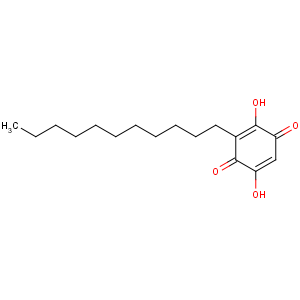Title: Embelin
CAS Registry Number: 550-24-3
CAS Name: 2,5-Dihydroxy-3-undecyl-2,5-cyclohexadiene-1,4-dione
Synonyms: 2,5-dihydroxy-3-undecyl-
p-benzoquinone; "Embelic acid"
Molecular Formula: C17H26O4
Molecular Weight: 294.39
Percent Composition: C 69.36%, H 8.90%, O 21.74%
Literature References: From fruit of
Embelia ribes Burm.,
Myrsinaceae. Isoln: Heffter, Feuerstein,
Arch. Pharm. 238, 15 (1900). Structure and synthesis: Fieser, Chamberlin,
J. Am. Chem. Soc. 70, 71 (1948).
Properties: Glistening orange plates from alcohol, benzene or acetic acid, mp 142-143°. Soluble in the usual hot organic solvents or in alkali hydroxide solns; very slightly sol in petr ether. Practically insol in water.
Melting point: mp 142-143°
Derivative Type: Diammonium salt
Synonyms: Ammonium embelate
Molecular Formula: C17H34N2O4
Molecular Weight: 330.46
Percent Composition: C 61.79%, H 10.37%, N 8.48%, O 19.37%
Properties: Grayish-violet powder. Sol in water, dil alcohol.
Derivative Type: Disemicarbazone
Molecular Formula: C19H32N6O4
Molecular Weight: 408.50
Percent Composition: C 55.86%, H 7.90%, N 20.57%, O 15.67%
Properties: Pale-brown needles from dil alcohol, dec 236°.
Derivative Type: Dioxime
Molecular Formula: C17H28N2O4
Molecular Weight: 324.42
Percent Composition: C 62.94%, H 8.70%, N 8.63%, O 19.73%
Properties: Pale-yellow needles from acetic acid, mp 278°.
Melting point: mp 278°
CAUTION: Handle with care; irritates mucous membranes and may cause prolonged and violent sneezing!
Therap-Cat: Ammonium embelate as an anthelmintic (Cestodes).
Keywords: Anthelmintic (Cestodes).

